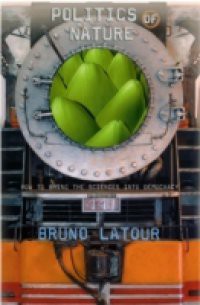A major work by one of the more innovative thinkers of our time, Politics of Nature does nothing less than establish the conceptual context for political ecology--transplanting the terms of ecology into more fertile philosophical soil than its proponents have thus far envisioned. Bruno Latour announces his project dramatically: "Political ecology has nothing whatsoever to do with nature, this jumble of Greek philosophy, French Cartesianism and American parks." Nature, he asserts, far from being an obvious domain of reality, is a way of assembling political order without due process. Thus, his book proposes an end to the old dichotomy between nature and society--and the constitution, in its place, of a collective, a community incorporating humans and nonhumans and building on the experiences of the sciences as they are actually practiced. In a critique of the distinction between fact and value, Latour suggests a redescription of the type of political philosophy implicated in such a "commonsense" division--which here reveals itself as distinctly uncommonsensical and in fact fatal to democracy and to a healthy development of the sciences. Moving beyond the modernist institutions of "mononaturalism" and "multiculturalism," Latour develops the idea of "multinaturalism," a complex collectivity determined not by outside experts claiming absolute reason but by "diplomats" who are flexible and open to experimentation. Table of Contents: Introduction: What Is to Be Done with Political Ecology? 1. Why Political Ecology Has to Let Go of Nature First, Get Out of the Cave Ecological Crisis or Crisis of Objectivity? The End of Nature The Pitfall of "Social Representations" of Nature The Fragile Aid of Comparative Anthropology What Successor for the Bicameral Collective? 2. How to Bring the Collective Together Difficulties in Convoking the Collective First Division: Learning to Be Circumspect with Spokespersons Second Division: Associations of Humans and Nonhumans Third Division between Humans and Nonhumans: Reality and Recalcitrance A More or Less Articulated Collective The Return to Civil Peace 3. A New Separation of Powers Some Disadvantages of the Concepts of Fact and Value The Power to Take into Account and the Power to Put in Order The Collective's Two Powers of Representation Verifying That the Essential Guarantees Have Been Maintained A New Exteriority 4. Skills for the Collective The Third Nature and the Quarrel between the Two "Eco" Sciences Contribution of the Professions to the Procedures of the Houses The Work of the Houses The Common Dwelling, the Oikos 5. Exploring Common Worlds Time's Two Arrows The Learning Curve The Third Power and the Question of the State The Exercise of Diplomacy War and Peace for the Sciences Conclusion: What Is to Be Done? Political Ecology! Summary of the Argument (for Readers in a Hurry...) Glossary Notes Bibliography Index From the book: What is to be done with political ecology? Nothing. What is to be done? Political ecology! All those who have hoped that the politics of nature would bring about a renewal of public life have asked the first question, while noting the stagnation of the so-called "green" movements. They would like very much to know why so promising an endeavor has so often come to naught. Appearances notwithstanding, everyone is bound to answer the second question the same way. We have no choice: politics does not fall neatly on one side of a divide and nature on the other. From the time the term "politics" was invented, every type of politics has been defined by its relation to nature, whose every feature, property, and function depends on the polemical will to limit, reform, establish, short-circuit, or enlighten public life. As a result, we cannot choose whether to engage in it surreptitiously, by distinguishing between questions of nature and questions of politics, or explicitly, by treating those two sets of questions as a single issue that arises for all collectives. While the ecology movements tell us that nature is rapidly invading politics, we shall have to imagine - most often aligning ourselves with these movements but sometimes against them - what a politics finally freed from the sword of Damocles we call nature might be like.

